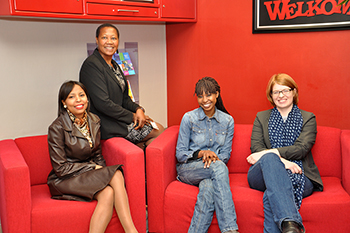Latest News Archive
Please select Category, Year, and then Month to display items
11 June 2021
|
Story Rulanzen Martin
|
Photo Courtesy of artists and the Johannes Stegmann Gallery.
![]()
Liminality is an exhibition of first-, second- and third-year student’s work in the
Department of Fine Arts at the University of the Free State (UFS). The works are from 2019 and 2020. Created during the hard lockdown of 2020, the artworks provide a glimpse of what students had to deal with and overcome during these times.
In a proposal for the exhibition, Angela de Jesus, Curator of the UFS Art Galleries, wrote: “The subtitle of the exhibition is ‘threshold, transition, transformation’ and it refers to the creative processes that students engaged with
in these adverse circumstances resulting in a wide array of artworks in both traditional and adapted mediums.”
The exhibition speaks to our shared experiences of insecurity, fragility, and discord, and to the resourcefulness and immutability of creative expression.
The virtual exhibition runs until 2 July 2021.
The exhibition is also currently available for viewing at the Johannes Stegmann Art Gallery, Sasol Library, UFS Bloemfontein Campus. Monday - Friday 09:00 - 16:00.
 MEGAN JOHNS, Battleground, Tobacco, charcoal dust, plaster of paris and resin, 93.5 x 50 x 7.5 cm
MEGAN JOHNS, Battleground, Tobacco, charcoal dust, plaster of paris and resin, 93.5 x 50 x 7.5 cm
 JACOBETH SELINGA, Linda, Installation: Found bed, wool and thread, 257 x 196 x 91 cm
JACOBETH SELINGA, Linda, Installation: Found bed, wool and thread, 257 x 196 x 91 cm
 POLOKO MOHANOE, Prayer for rain, Gouache on Fabriano, 66 x 72.8 cm
POLOKO MOHANOE, Prayer for rain, Gouache on Fabriano, 66 x 72.8 cm
 SEBOTSE SELAMULELA, In my image (Coronavirus head), Clay, 35 x 40 x 60 cm
SEBOTSE SELAMULELA, In my image (Coronavirus head), Clay, 35 x 40 x 60 cm
 WILLIAM SHAER, Creator, Deconstructed chair, koat wood and Imbura wood, 100 x 75 x 45 cm
WILLIAM SHAER, Creator, Deconstructed chair, koat wood and Imbura wood, 100 x 75 x 45 cm
 Johannes Stegmann Gallery
Johannes Stegmann Gallery
 Interior of the Johannes Stegmann Gallery
Interior of the Johannes Stegmann Gallery
UFS outperforms SA higher education in EU-Saturn programme
2016-12-14

Partnering between the UFS and other institutions
makes it possible for staff and students to study abroad.
Pictured from left front, are: Mareve Biljohn (EU-Saturn
at University of Groningen), Memory Mphaphuli (INSPIRE
at University of Ghent) and Wanda Verster (EU-Saturn at
Uppsala University). Back: Moliehi Mpeli (Erasmus Mundus
at University of Leuven).
Photo: Stephen Collett
The University of the Free State (UFS) strives to invest in its staff and students and a proven example can be seen in the latest cycle of the Erasmus Mundus EU-SATURN programme.
The UFS outperformed the higher education sector over the past five years as it had more exchange scholarships than most South African universities. A total of 16 (18%) out of the 89 local scholarships allocated until 2016 were from UFS. Stellenbosch University, with 14 scholarships, was second.
University one of main roleplayers
Chevon Jacobs, Senior Officer said: “Internationalisation at the UFS is a great achievement as the university allocated all available scholarships to eligible staff and students. She said the strong partnership history between the university and some European institutions, due to a similarity between the language and culture of especially Dutch-speaking countries, is one of the reasons for the success.
“We are very proud of our participation. We have invested for these predominantly young members to spend time abroad in furthering their qualifications,” she said.
The EU-Saturn project has been jointly co-ordinated for the past five years by the University of Groningen, Netherlands, and the UFS.
One of few projects funded by Erasmus Mundus
The Erasmus Mundus is an international partnership aimed at enhancing the quality of European higher education and the promotion of dialogue and understanding between people and cultures through co-operation with other countries. The EUROSA, EU-Saturn, Aesop and INSPIRE to name a few, are all programmes funded by the European Union through the Erasmus Mundus. These projects offer fully funded part-time or full-time postgraduate scholarships for study in Europe.
Some of the universities UFS students have studied at are the University of Groningen, the University of Newcastle, England, and the University of Ghent, Belgium.
Successful UFS grantees awarded scholarships over the past five years:
• Maria Campbell (2014 – PhD) – University of Newcastle
• Sethulego Matebesi (2014 – PhD) – Uppsala University
• Lindie Koorts (2016 – PhD) – University of Groningen
• Reginald Makgoba (2013/2014 – Master’s) – University of Newcastle
• Sanet Steyn (2013/2014 – Master’s) – University of Groningen
• Johnathan Adams (2015/2016 – Master’s) - Göttingen University
• Eben Coetzee (2013/2014 - PhD) – University of Groningen
• André Janse van Rensburg (2013/2014 – PhD) – University of Ghent
• Martin Rossouw (2013-2015 – PhD) – University of Groningen
• Jan Schlebusch (2013-2016 – PhD) – University of Groningen
• Carel Cloete (2014-2016 – PhD) – University of Groningen
• Nadine Lake (2014-2016 – PhD) – Uppsala University
• Elbie Lombard (2014-2016 – PhD) – University of Ghent
• Luyanda Noto (2014/2015 – PhD) – University of Ghent
• Mareve Biljohn (2015/2016 – PhD) – University of Groningen
• Wanda Verster (2015/2016 – PhD) – Uppsala University